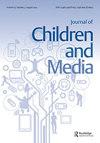Honesty, morality, and parasocial relationships in U.S. children’s media
IF 2.1
3区 心理学
Q2 COMMUNICATION
引用次数: 1
Abstract
ABSTRACT This study explores children’s responses to animated, ficational characters when honesty is put to the test through behaviors of racialized, peer-like media characters. Children (n = 178, aged 8–13 years) viewed an episode of a popular U.S. television program, Nickelodeon’s The Loud House, with a dishonest White character (Lincoln) or an honest Black character (Clyde). The findings confirm that Clyde who is portrayed as honest is seen as more honest, higher in morality, and liked more than Lincoln who deliberately lies. Race did not impact how much children like the White character (Lincoln), but Black children reported liking the Black character (Clyde) more than White children. Children who have previously seen the show are more likely to like and have a stronger parasocial relationship with the characters, with a regression pinpointing this is most important for Lincoln, the White character. The main finding that the regression analyses tease out is that it is the parasocial relationship that is significantly positively related to how likable and moral the children rate the characters, not race and racial attitudes. Implications are discussed within a context of mediated contact, social construction of identity and groups, and moral judgements. IMPACT SUMMARY Prior State of Knowledge: Previous research suggests that youth can learn moral behaviors from media characters. However, few television studies with youth have examined character honesty and race in a research investigation. Novel Contributions: Children who feel emotionally connected to a media character can be more accepting of problematic behavior of the character. Racial bias and preferences for Black or White media characters indicate that racial awareness is salient for youth. Practical Implications: Children’s relationships with media characters can have implications on their learning about consequences of moral behaviors. Practitioners should be thoughtful in their representations of characters, particularly children of color, reaching for more positive portrayals of children of color as a means to mitigate judgment of others and enhance interracial relationships.美国儿童媒体中的诚实、道德和反社会关系
摘要本研究通过种族化的、类似同龄人的媒体角色的行为,探讨了当诚实受到测试时,孩子们对动画化的、夸夸其谈的角色的反应。儿童(n=178,年龄8-13岁)观看了美国流行电视节目尼克频道的《大声的房子》的一集,其中有一个不诚实的白人角色(林肯)或一个诚实的黑人角色(克莱德)。研究结果证实,被描绘成诚实的克莱德比故意撒谎的林肯更诚实、道德更高、更受欢迎。种族并没有影响孩子们喜欢白人角色(林肯)的程度,但据报道,黑人孩子比白人孩子更喜欢黑人角色(克莱德)。看过这部剧的孩子更有可能喜欢剧中的角色,并与他们建立更牢固的准社会关系,回归分析表明,这对白人角色林肯来说是最重要的。回归分析得出的主要发现是,正是准社会关系与孩子们对角色的好感和道德评价呈正相关,而不是种族和种族态度。在中介联系、身份和群体的社会建构以及道德判断的背景下讨论了影响。影响总结先前的知识状态:先前的研究表明,年轻人可以从媒体人物身上学习道德行为。然而,很少有针对年轻人的电视研究在研究调查中考察性格诚实和种族。小说贡献:感觉与媒体角色有情感联系的孩子可以更容易地接受角色的问题行为。对黑人或白人媒体人物的种族偏见和偏好表明,年轻人的种族意识很突出。实际意义:儿童与媒体人物的关系可能会影响他们对道德行为后果的学习。从业者在表现人物时,尤其是有色人种儿童时,应该深思熟虑,对有色人种儿童进行更积极的刻画,以此来减轻对他人的评判,加强跨种族关系。
本文章由计算机程序翻译,如有差异,请以英文原文为准。
求助全文
约1分钟内获得全文
求助全文

 求助内容:
求助内容: 应助结果提醒方式:
应助结果提醒方式:


